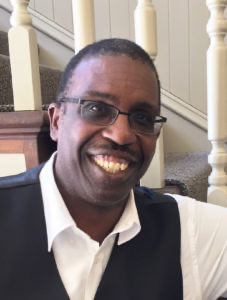Coronavirus Disease 2019
How to Support the Anxious and Bereaved During COVID-19
Interview with Rev. Floyd Thompkins on caring for those who are grieving.
Posted August 8, 2020

The coronavirus pandemic has brought trauma, grief, and sorrow upon many. Faith leaders and mental health professionals are seeking to provide support amidst these mental health issues.
Rev. Floyd Thompkins served as Dean of Religious Life at two world-class institutions, Stanford and Princeton universities. He has developed unique, highly effective programs to empower underserved teenage youth and young adults in urban and rural areas—in East Palo Alto, CA, and rural South Georgia. He was senior pastor at Antioch Baptist Church, the second oldest African American Church west of the Mississippi, and he was the Education and Administrative Pastor of Covenant Christian Church in Douglas, GA. During his first year of being the Director of the Center for Innovation in Ministry at San Francisco Theological Seminary, the center was awarded an Innovation Grant from the Northern Kaiser Family Foundation.
This is part two of a two-part interview with Rev. Floyd Thompkins of The Foundation for Justice and Peace (JPF); you can find part one here.
Jamie Aten: Is there anything that surprised you in your findings, or that you weren't fully expecting?
Floyd Thompkins: What was most surprising to me was the unacknowledged effect of the stress and frustration of the enforced changes during COVID-19 on caregivers. Pastors, mental health professionals, and public health officials passionately communicated their exhaustion and emotional pressures which were considerable. Self-care was an issue that I had not anticipated to be so glaringly important and missing from the dialogue on caregiving.
The other issue was the rarity of this kind of dialogue with the framework of parity, not just education. JPF believes that listening to one another’s lived experiences leads to better research, more accurate policy, and better systems of dissemination.
JA: How might readers apply what you found to their lives during COVID-19?
FT: There is a need to establish cross-disciplinary conversations between mental health professionals and pastoral care counselors, professionals and non-professionals. These relationships should encourage the creation of group-based mental health and spirituality congregational help groups. Specifically, bereavement and anxiety groups would be helpful. People are going to churches gathering virtually. Churches are being called on to do more nontraditional programming. The creation of peer support groups can help provide spiritual support, recognizing and helping people get additional services when needed.
JA: How can readers use what you found to help others amidst this pandemic?
FT: We should understand that the bereavement process will be protracted and may represent more than the usual family strain. At our subsequent mental health conference and in the present project with pastors from around the country, we have discovered that there is a greater need to reach out to the families of people who have died in this time and tell them (via letter, video, or phone call) exactly what the deceased person meant to you. Funerals are for the living and the families need to know that their loved ones were loved by others and lived significant lives.
Finally, we have to accept the lived experience of people’s trauma. Imagine having people argue about the reality of the existence of something when you have people who have died in your family. Pastors and mental health professionals implored people to remember as the first step to hope, respect, and listen to the lived experiences of people without religious or political judgment. In classical religious language “Empathy is the first step to effective witness”; in clinical language, “Accepting people’s feelings is the first step to people letting you help them develop effective coping mechanisms.”
JA: What are you currently working on that you might like to share about?
FT: Subsequent to this conversation, JPF co-sponsored a Mental Health and Spirituality Conference with the University of Redlands. We now are involved in a six-month study with African American Churches from around the country in order to help them create congregational support groups, define best practices for bereavement, navigate trauma across the life-span, and create healing rituals for churches.
In September, we are having our second conference of mental health providers, pastors, and public health officials. This conference, Stony the Road We Trod, will concentrate on A.C.E.s (adverse childhood experiences) and family trauma in the time of COVID-19. In October, JPF will hold another conference for caregivers and teachers.
References
Thompkins, F., Jr., Goldblum, P., Lai, T., Hansell, T., Barclay, A., & Brown, L. M. (2020). A culturally specific mental health and spirituality approach for African Americans facing the COVID-19 pandemic. Psychological Trauma: Theory, Research, Practice, and Policy, 12(5), 455-456. http://dx.doi.org/10.1037/tra0000841


